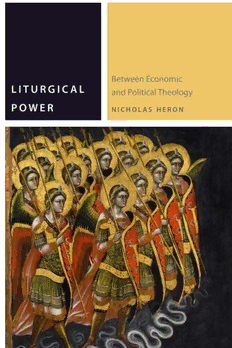
Liturgical Power: Between Economic and Political Theology PDF
Preview Liturgical Power: Between Economic and Political Theology
liturgical power fordham university press new york 2018 commonalities Timothy C. Campbell, series editor LITURGICAL POWER Between Economic and Political Theology nicholas heron this book is made possible by a collaborative grant from the andrew w. mellon foundation. Copyright © 2018 Fordham University Press All rights reserved. No part of this publication may be reproduced, stored in a retrieval system, or transmitted in any form or by any means— electronic, mechanical, photocopy, recording, or any other— except for brief quotations in printed reviews, without the prior permission of the publisher. Fordham University Press has no responsibility for the persistence or accuracy of URLs for external or third- party Internet websites re- ferred to in this publication and does not guarantee that any content on such websites is, or will remain, accurate or appropriate. Fordham University Press also publishes its books in a variety of electronic formats. Some content that appears in print may not be available in electronic books. Visit us online at www.fordhampress.com. Library of Congress Cataloging- in- Publication Data available online at http://catalog.loc.gov. Printed in the United States of America 20 19 18 5 4 3 2 1 First edition contents Introduction 1 1 The Economic God 15 2 Liturgical Power 41 3 The Practice of Hierarchy 75 4 Instrumental Cause 89 5 Anthropology of Office 116 Conclusion 133 Acknowledgments 141 Notes 143 Bibliography 187 Index 199 This page intentionally left blank In societate angelorum omnia possidentur communiter; sed tamen quaedam excellentius habentur a quibasdam quam ab aliis. [In the society of angels all things are shared in common, but some share in them in a more excellent way than others.] —st. thomas aquinas Every heightening of direct power also thickens and condenses the vaporous circle of indirect influences. —c arl schmitt This page intentionally left blank INTRODUCTION Today, the question of political theology unexpectedly stands near the cen- ter of theoretical discussion in the humanities and social sciences.1 And yet, ever since Carl Schmitt first pronounced his celebrated thesis accord- ing to which “all significant concepts of the modern theory of the state are secularized theological concepts”2 it has almost exclusively been assumed that the vector charted by the theological- political travels in one direction and in one direction only. Whether the relation between the two terms has been understood according to the stronger model of genetic derivation or whether according to the weaker model of structural homology,3 the orientation has remained always the same: from the heavens to the earth, from the religious to the secular, from the theological to the political. The present study, by contrast, offers a different account and a different trajec- tory. It examines a sequence of ostensibly theological concepts and figures, which assume their surprising political significance only if situated in a perspective articulated according to the inverse orientation. And not only on account of the fact, in itself insignificant, that these concepts and fig- ures can be shown to have their provenance in the civic sphere (or at least in a context where the positing of a clear distinction between the “civic” and the “religious” would be meaningless); but also, and indeed above all, because they acquire their specific force— and hence, their particular her- meneutic value— only in the course of their Christianization as the more or less worldly instruments of a polis that has been definitively shifted out of this world. A guiding premise of the following investigation is that the prevailing discourse around political theology has for the most part all too casually and uncritically accepted the pertinence and even self- evidence of the two structuring hypotheses that marked its twentieth- century point of
